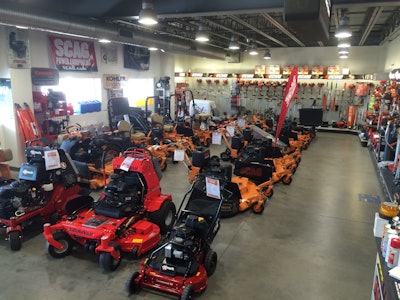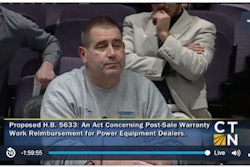
It was a grueling, contentious, better than three-year process. After all of the dust had settled and legal arguments had been heard, New Hampshire's "Auto Dealer Bill of Rights" hurdled its final roadblock back in October when the U.S. Supreme Court declined to hear a legal challenge to the law. As a result, New Hampshire automobile dealers are better protected from suppliers—and so are equipment dealers.
New Hampshire Senate Bill 126 amended an older version of the law, RSA 357-C. The new law changes the definition of "motor vehicle" to include farm and utility tractors, forestry equipment, industrial equipment, construction equipment, farm implements, farm machinery, yard and garden equipment, attachments, accessories and repair parts. Off-highway recreational vehicles and snowmobiles were already included.
"It's very important to have laws that level the playing field between dealers and manufacturers," says one New England dealer. "That is exactly what this law in the state of New Hampshire does for equipment dealers. Dealers worked hard as a team to make this law happen. It's something to be proud of."
The Northeast Equipment Dealers Association (NEDA) worked closely with the New Hampshire Automobile Dealers Association to lobby the law's passage.
"It was a long, arduous process," says Tim Wentz, field director for NEDA. "The hearings started in the first part of January (2013) and went clear through to May. Virtually every week we were in Concord, NH, on that second floor. To the dealers' credit, they packed those committee rooms. They often had to open up partitions and it was still standing room only. That is what really made the difference. The legislators could see that people really cared."
In New Hampshire, there already was separate legislation that governed equipment dealers. Wentz says lawmakers took that definition of "equipment dealers" and had it woven into the separate auto dealer law.
"When I'd first started with NEDA back in 1999, everybody was telling me that what had happened with the auto industry was going to happen to the power equipment industry," says Wentz. He's referring to mass consolidation and a reduction in the total number of servicing dealers. "I don't think I've ever heard a more truthful statement.
"When you look at the dealer agreements in auto and compare them to our industry, they include much of the same text," Wentz continues. "Additionally, the manufacturer behaviors are the same. The dealer behaviors are the same. The end-consumers are also often the same. A landscaper is buying a truck and a mower or skid steer, etc. A consumer is buying a car and a mower for his or her lawn. It's the same customer base."
In other words, the automobile and equipment industries are very similar when it comes to the manufacturer-dealer dynamic. Thus, collaboration between auto dealers and equipment dealers was natural—and each deserve the same protections, the courts have concluded.
Many on the manufacturer side do not agree. They see big differences between the auto industry and the outdoor power equipment industry. For one, power equipment makers often sell through more than just dealers. Many sell through box stores, for instance, while some sell online. Many use a combination of two or all three.
"Generally speaking, we don't support putting outdoor power equipment dealer protections in an auto dealer statute," says Kris Kiser, president and CEO of the Outdoor Power Equipment Institute (OPEI), a manufacturer association.
Nonetheless, the State of New Hampshire thinks auto dealers and equipment dealers should be viewed similarly. There is one exception, though. Stihl won its appeal to be excluded from the law. Stihl's "handheld" equipment, the courts found, doesn't have wheels or a transmission. Thus, that equipment shouldn't be considered a "motor vehicle". A handful of other manufacturers—AGCO, CNH (i.e. Case, New Holland), Husqvarna, John Deere and Kubota—also appealed, but to no avail.
Why dealers like the New Hampshire law
The New Hampshire law does several important things from the dealer's perspective. Cutting through the labyrinth of legal mumbo jumbo, here is a summary of the law's most important elements.
Succession. The law makes it easier for dealers to facilitate familial business succession by including adopted, step and lineal descendents, in addition to spouses, children, grandchildren, siblings and parents.
Competition. The law generally prohibits a "manufacturer or distributor" (*supplier) from competing with a dealer in that dealer's contracted market area. Some exceptions naturally occur.
Suppliers also cannot change the market area set forth in the dealer agreement without good cause. Good cause could include changes in the dealer's registration pattern, demographics, customer convenience and geographic barriers. If a change is about to take place, though, the supplier must give the dealer at least 60 days' notice—along with the information, data and methodology used to conclude that a change is necessary.
Measuring dealer performance. Equipment sold outside of the dealer's territory cannot be considered when measuring that dealer's sales performance. All that should be measured is how a dealer performs within his or her specified market area. That performance can then be used to evaluate whether or not a dealer is performing up to expectation, and to administer any incentive programs. Additionally, performance standards must be applied uniformly across similarly situated dealers.
Vigorous communication with the dealer is also mandated. Once a year, dealers can request reports that include:
- All written correspondence with the dealer over the past 12 months
- Reports created by the supplier memorializing any contact with the dealership or its employees
- The supplier has 30 days to satisfy the dealer's request
- The supplier can charge a reasonable per-page fee
- Documents discussing any possible insolvency, or criminal or fraudulent activity by the dealer can be excluded.
Other items dealers need to buy. The law gives dealers some control over the various goods or services they must purchase in order to operate the business, such as signage, tools and materials. In other words, the supplier cannot require a dealer to purchase from a specific vendor—unless the supplier substantially reimburses the dealer for those purchases. "Substantial" means at least 65% of the cost, which can't be greater than the total cost of the goods from another vendor the dealer would rather buy from.
With respect to signage and branding materials specifically, the supplier does have the right to approve the work of an alternate vendor in order to preserve its intellectual property rights. In other words, hypothetically speaking, a dealer doesn't have the right to hire an alternate vendor to create a sign that looks terrible and damages the supplier's brand image.
Finally, dealers are granted some local decision-making ability to choose their floorplan sources.
Facility. Suppliers cannot require a dealer to enter into a site-control agreement or exclusive-use agreement. This gives dealers control over what they use their facilities for and what products they sell.
"When you're carrying multiple lines of equipment, being forced to operate separate facilities and staffing for each line is just not economically viable—especially in New England," one New England dealer says.
Additionally, suppliers generally can't force dealers to change location, substantially update their facilities or add/replace signage. If a supplier feels that a change is reasonable and necessary due to economic conditions or financial expectations, the supplier has the burden of proving it.
Furthermore, suppliers cannot require dealers to upgrade their facilities more frequently than every 15 years. After a 15-year period has elapsed, the supplier has the burden of proving that a facility upgrade is necessary. Exceptions could be when health, safety and technology requirements are called into question. Another caveat is if the supplier offers "substantial" (at least 65%) reimbursement for the improvements, which can't be greater than the total cost from a vendor the dealer would prefer to buy from.
Service and parts. Warranty Repair is the big area of contention. Suppliers must now reimburse dealers at full retail for parts used in warranty repairs (this requirement is already present in several other states). Also, suppliers must pay a given dealer's posted shop labor rate.
"We as dealers often don't get paid fairly for the warranty work we do for manufacturers," a New England dealer says. "The New Hampshire law helps with that, for sure."
Also as part of the new law, a supplier cannot require a dealer to sell an extended service contract or maintenance plan. And service-only dealers are given full protection under this law.
Inferior dealers get a lifeline?
It is important to note that "single-line dealers" are not protected under this law. A single-line dealer is defined as one that has purchased at least 75% of its inventory from a single supplier, and has total average annual sales volume in excess of $100 million in its defined market area. Suffice to say, there aren't too many equipment dealers that fall into this category.
What does that mean? Well, a massive dealer largely tied to a single brand is likely to be in a pretty good position with that brand. The dealers who need more protection are those selling numerous brands of equipment, and those selling given brands of equipment where additional dealers are in close proximity.
Manufacturers are concerned that the New Hampshire law, through its heightened dealer protections, will entrench poor-performing dealers in the marketplace. Legal filings by a lawyer representing the OPEI last May went on to say, "The law makes it virtually impossible for a yard and garden equipment manufacturer to terminate a poor-performing dealer or add a new dealer in the state of New Hampshire, unless that manufacturer first obtains state approval through a cumbersome, protracted, and unduly expensive process stacked against the manufacturers."
Kiser added, "Ultimately, the New Hampshire law needlessly meddles in the manufacturer-dealer relationship, hinders the free marketplace, and hurts consumers (by limiting strong competition among dealers)."
Some think a little bit of meddling was sorely needed. One dealer says, "If you are a good dealer who wants to succeed, you understand it's a two-way street. A good dealer will want to make the proper investments and commitments on behalf of the manufacturer so he is providing excellent service and taking care of the customer. For the dealers who are performing poorly and not putting the appropriate effort in, it might be a little bit tougher for a manufacturer to get rid of them, but they still can. But you know what, it was the manufacturer who set that dealer up in the first place. There are still plenty of ways for the manufacturer to ensure that the dealers who represent them are good dealers."
"Dealers saw what was happening when they wanted to put up a new store, or perhaps sell the business to a family member or one of their employees," Wentz adds. "Some manufacturers would say, 'You can't do that unless you get rid of one of these competing lines.
"Similarly, we also started to see more instances where some manufacturers would see competing lines of equipment at one of their dealers," Wentz continues. "All of a sudden that dealer is having discounts taken away. NEDA's position is about preserving the free marketplace and taking care of the consumer. If the dealer isn't able to provide the customer with the best equipment for that particular application, the dealer loses credibility pretty quickly. Competition ensures that the end-users get the most cost-effective product for their money."
In the interest of competition and fair market principles, wouldn't it also make sense to allow more than one dealer of the same brand in the same market area?
On that note, it is interesting that this first domino to fall has fallen in New Hampshire, a state known for its libertarian tendencies. After all, the state motto is, "Live Free or Die." Government interference in free market activity is generally frowned upon. That said, the protection of personal liberty is of critical importance. Perhaps that is why a law protecting "the little guys'" ability to operate his or her business captured the state government's attention.
Proliferation of dealer protection laws
Dealers around the country are probably wondering if something like this could happen in their state. Those in Vermont already have an answer: yes.
The State of Vermont passed a new law back in July, Senate Bill 224 (Act 142). Legislators say the new law is necessary to protect the state's economy. There is a strong need for a reliable servicing dealer network to help support the vitally important farm and forestry industries of the state, not to mention the snowmobile and ATV industries.
Lawmakers also say the law is necessary to help protect consumers. A more even playing field between suppliers and dealers will help dealers prosper, creating a stronger competitive environment that benefits the consumer through improved service and retail prices.
Unlike in neighboring New Hampshire, the Vermont law is not tied to the automotive industry. The law defines "equipment dealer" as anyone primarily dealing in the retail sales of farm, utility, forestry, yard and garden, or industrial equipment. The "motor vehicle" loophole doesn't appear to exist.
The law also dictates some requirements for when a supplier wants to terminate a dealer agreement, including:
- Supplier must have just cause to terminate and also provide specific reference to at least one violation of the dealer agreement
- Notice must be delivered in writing at least 120 days prior to date of termination
- Dealer has 60 days to meet the requirements cited in the notice
- If it's a sales performance issue, the supplier must work in good faith with the dealer for two years in an effort to improve performance.
The Vermont law also stipulates some buy-back terms for when a dealer agreement is severed. For instance, the supplier must repurchase inventory, along with any supporting materials such as manuals or signage, within 90 days. Dealers are to be paid "net cost" for wholegoods inventory—dealer cost minus incentives plus freight and assembly—on everything purchased over the past 30 months, less a reasonable allowance for weather-caused deterioration. With respect to parts inventory, dealers are to be paid 100% of net cost for all new and undamaged parts, and 95% for superseded and/or noncurrent parts.
With respect to Warranty Repair, dealers are to be paid their posted shop labor rates. Warranty-related parts are to be reimbursed at dealer cost plus 20%, plus any shipping and handling fees. Suppliers must pay all approved warranty claims within 30 days. If a claim is denied but not in writing within 30 days, it is to be assumed that the claim has been approved, and thus, should be paid.
The Vermont law also identifies some prohibited acts on the part of a supplier, including:
- Can't force dealers to accept inventory they haven't ordered
- Can't prohibit dealers from selling a competing line of product
- Can't require a dealer to operate a separate facility and/or staff for other brands
- Can't change a dealer's territory without good cause.
It's a two-way street
Manufacturers tend to think that what has happened in New Hampshire and Vermont will spread to other states throughout 2017. "I think we'll see a lot of action this year," Kiser says. "We look forward to working with our dealers on these issues going forward. We have good relationships with our dealers in the outdoor power industry; we meet with dealers regularly. It's a symbiotic relationship. We look forward to continued dialogue—and a consensus strategy going forward."
At the end of the day, the supplier-dealer relationship should be—and often is—a real partnership. When a strong equipment brand works in close, honest collaboration with a strong dealer brand, both the manufacturer and dealer benefit. And you know what? So does the end customer.
* For the sake of brevity, we referred to "manufacturers or distributors" simply as suppliers.


![Doosan Bobcat Wacker Neuson Stack 2ec Js Pb V6e[1]](https://img.greenindustrypros.com/mindful/acbm/workspaces/default/uploads/2025/12/doosan-bobcat-wacker-neuson-stack2ecjspbv6e1.CPyyz8ubHn.png?auto=format%2Ccompress&bg=fff&fill-color=fff&fit=fill&h=100&q=70&w=100)







![Doosan Bobcat Wacker Neuson Stack 2ec Js Pb V6e[1]](https://img.greenindustrypros.com/mindful/acbm/workspaces/default/uploads/2025/12/doosan-bobcat-wacker-neuson-stack2ecjspbv6e1.CPyyz8ubHn.png?ar=16%3A9&auto=format%2Ccompress&bg=fff&fill-color=fff&fit=fill&h=135&q=70&w=240)








